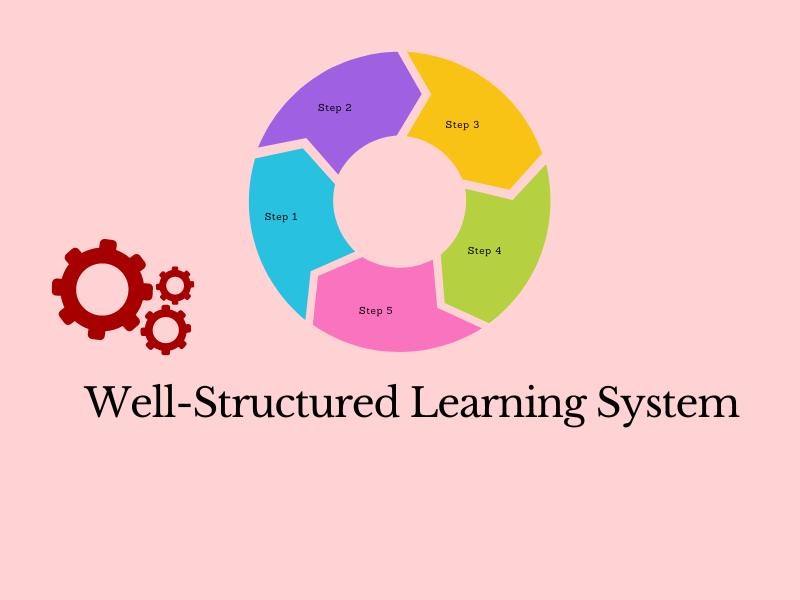In today’s dynamic landscape, where advancements and changes occur rapidly, the quest for knowledge and skills has gained paramount importance. As organizations strive to facilitate education and empower communities, the role of a thoughtfully designed learning system has emerged as a linchpin. This article delves into the indispensable need for a meticulously structured approach to learning. It explores how organizations are recognizing the significance of systematically delivering education, emphasizing not only the broader concept but also shedding light on our organization’s unique approach. By elucidating the importance of a well-organized learning system, this article aims to highlight the path toward effective education, growth, and empowerment.
The Foundation of Effective Learning: A Structured System
Education is far more than a mere transfer of knowledge. It’s a transformative journey that shapes individuals and societies. At its core lies a well-structured learning system, which acts as the bedrock for this transformative process. This systematic approach offers a carefully orchestrated framework that not only facilitates the delivery of information but also nurtures intellectual and personal growth. By encompassing facets like curriculum design, instructional techniques, evaluation methods, and cultural sensitivity, a robust learning system ensures that education becomes a comprehensive and meaningful experience. This article explores the pivotal role of such a system in facilitating effective education, highlighting its multifaceted components and the impact it has on both learners and educators.
Tailoring Education to Unique Needs
In the ever-evolving landscape of education, a fundamental shift is underway. The realization that a standardized, uniform approach to learning falls short in meeting the dynamic needs of learners has led organizations to embrace a more tailored strategy. This approach acknowledges that each community, culture, and individual possesses distinct requirements that influence the learning process. For instance, our organization stands as a beacon of this paradigm shift. Through extensive research and engagement with ethnic groups, we dive deep into their unique circumstances and cultural intricacies. This vital groundwork allows us to create bespoke education plans that align with local realities, ensuring that the learning experience is not only relevant but also resonates profoundly with the communities we serve.
Incorporating Local Voices and Expertise
Creating a truly impactful learning system involves going beyond textbooks and classrooms. Our organization recognizes the invaluable wealth of knowledge and insights held by the very communities we aim to empower. By actively involving local voices and expertise in the educational journey, we tap into a wellspring of authentic understanding. This approach ensures that the learning experience isn’t detached from the community’s realities but rather resonates deeply with their aspirations and challenges. The direct engagement of community members in planning and implementation creates a collaborative ecosystem where education becomes a shared endeavour. Through this approach, learners not only receive information but also feel a profound sense of ownership and agency, driving their commitment to learning and transformation.
The Role of Research in Developing Learning Plans
Research forms the bedrock of effective learning systems, providing the data-driven foundation upon which educational strategies are built. Our organization recognizes the pivotal role of research in crafting meaningful learning plans. By conducting thorough research, we gain valuable insights into the specific needs, aspirations, and barriers faced by different communities. This comprehensive understanding guides the design of our education programs, ensuring that they are not only culturally relevant but also responsive to the real challenges on the ground. From assessing learning gaps to identifying teaching methodologies that resonate, research empowers us to create impactful learning experiences that foster genuine growth and transformation. This commitment to evidence-based education cements the connection between knowledge and its practical application, ultimately enriching lives and uplifting communities.
Cultivating Lifelong Learning
Cultivating a culture of lifelong learning is a cornerstone of an effective learning system. Beyond equipping individuals with immediate skills and knowledge, such a system ignites curiosity and enthusiasm for learning that extends throughout their lives. Organizations that prioritize this approach recognize that the world is in a constant state of evolution, requiring individuals to continuously acquire new skills and knowledge. By nurturing a love for learning, they empower individuals to embrace change, navigate complexities, and contribute to the betterment of their communities. This commitment to lifelong learning not only enhances personal development but also ensures that communities remain adaptable, innovative, and well-equipped to face the challenges of the modern world.
The Path Forward: A Brighter Future Through Learning Systems
The path forward towards a brighter future is paved by the implementation of effective learning systems. These systems, grounded in research and tailored to local contexts, hold the potential to transform individuals and communities alike. By embracing a structured approach to education, organizations ensure that learning becomes a powerful tool for empowerment, personal growth, and societal progress. Such systems foster a sense of ownership, promote inclusivity, and ignite a passion for lifelong learning. As organizations continue to prioritize and refine these approaches, they contribute to building a more informed, skilled, and resilient society, prepared to face the challenges and opportunities of tomorrow with confidence and determination.
Conclusion: Forging Ahead with a Well-Structured Learning System
In an ever-changing world, the essence of a well-structured learning system emerges as a driving force for individual and collective advancement. Through tailored education plans, local insights, and research-driven strategies, organizations hold the key to unlocking the potential within communities. The path to progress lies in the commitment to systematic education, empowering individuals with the tools to navigate complexities and embrace lifelong learning. From fostering cultural understanding to cultivating a passion for knowledge, a structured approach not only imparts skills but also ignites a sense of purpose and agency. As we move forward, the ripple effects of these efforts amplify, forging a path to a brighter, more informed, and empowered future for all.
